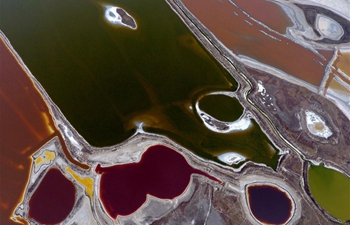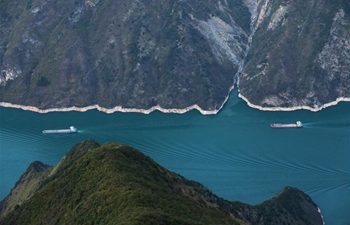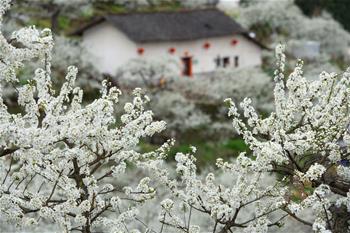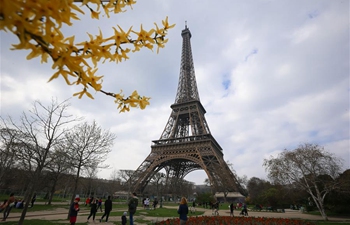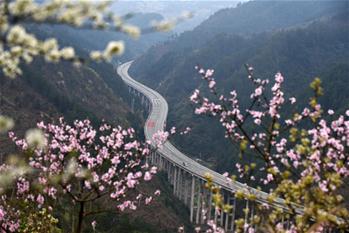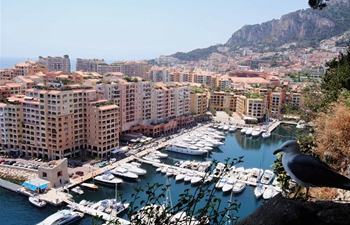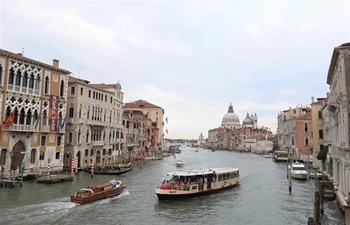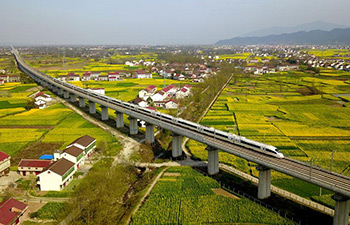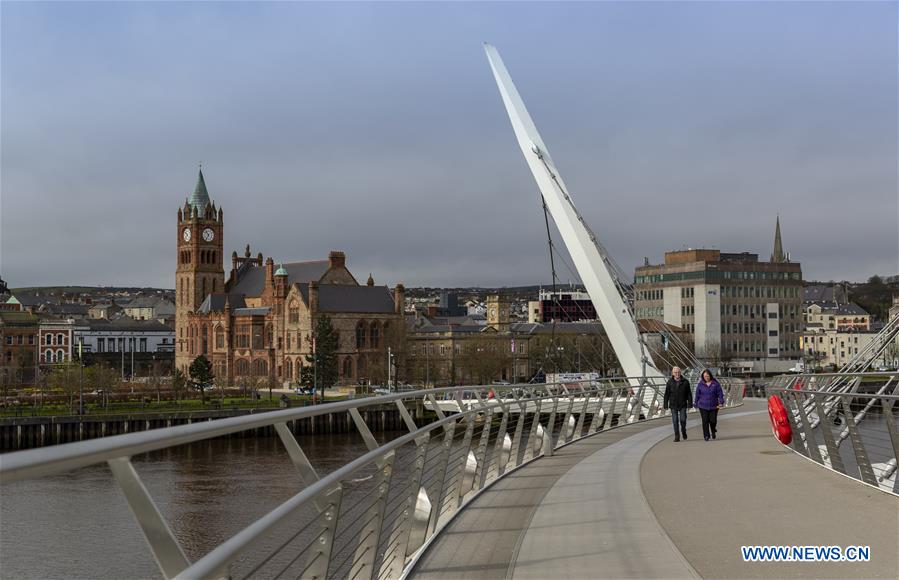 ?
?People walk on the "Peace Bridge" in Derry, a border city in Northern Ireland, the United Kingdom, on March 20, 2019. The looming possibility of a hard Irish border that could be created by Brexit causes agony to people in Derry, a border city in Northern Ireland not unfamiliar with dark days of division and violence. (Xinhua/Han Yan)
by Xinhua writers Gui Tao, Gu Zhenqiu and Jin Jing
BELFAST, Britain, March 26 (Xinhua) -- The looming possibility of a hard Irish border that could be created by Brexit causes agony to people in Derry, a border city in Northern Ireland not unfamiliar with dark days of division and violence.
There are widespread concerns in Derry over the inconveniences caused by the possible return after 21 years of border posts, police patrols and security installations prompted by a no-deal Brexit.
A hard border between Northern Ireland and the Republic of Ireland could jeopardize the security of the second largest city in Northern Ireland, which manages over 46,600 cross-border journeys each day.
John Boyle, mayor of Derry, told Xinhua in an exclusive interview that his city supports the retention of the current soft border that facilitates the movement of people, goods and services.
"Brexit has brought very significant challenges," he said. "A no-deal Brexit is potentially a disaster for us."
Boyle said Brexit uncertainty has made it very difficult for the city to prepare for eventualities.
GAME CHANGER
The zigzagging 500-km border that separates the Republic of Ireland from Northern Ireland is embroiled in a tug-of-war at the epicenter of the ongoing Brexit crisis.
Britain's withdrawal deal has twice been vetoed by its Parliament in part due to concerns over the Irish border arrangement known as the 'backstop'.
According to the European Union (EU), this arrangement is intended as a safeguard mechanism that would keep Britain in a customs union with the EU and would remove the need for checks along the border until a permanent new trading relationship is found.
But many pro-Brexit British lawmakers fear the 'backstop' will trap Britain in regulatory lockstep with the EU, insisting they won't vote for a divorce deal unless it is removed.
EU leaders, however, said the Withdrawal Agreement they concluded with the British government cannot be reopened.
The power struggle over the border could be a game-changer for the island of Ireland and the United Kingdom as a whole. Brexit is set to change the current border between two countries into a border between EU and non-EU areas. The once hardly felt boundary will thus become Britain's first land border with other European countries.
Zhang Meifang, Chinese consul general in Belfast, explained to Xinhua that the security situation in Northern Ireland is generally stable and local residents and businesses that are bound to be affected by changes to the status quo on the border are closely following the latest Brexit news.
Brian Renaghan, 50, whose farm is split into two by the Irish border - one half in County Armagh in Northern Ireland and the other in County Monaghan in the Republic of Ireland, said Brexit had put him into an awkward situation.
Along with a hard Brexit would come the disappearance of EU subsidies for half of Renaghan's farm, calling into question whether he and his cattle could continue to move freely as they do now.
"The farm has been hijacked by Westminster," he told Xinhua. "They do not understand the rural areas and they do not understand Ireland."
The farmer, whose family has been running the border farm for four generations, set up his own blog titled "Brexit Farm" and started unloading both his frustration and his hopes.
HORRIFIC MEMORIES
The Irish border area was a flashpoint during the decades of conflict that cost over 3,600 lives after the 1960s. The free flow of people and goods across the near-invisible border today underpins both the local economy and Northern Ireland's peace process.
The Irish Republican Army (IRA) waged a campaign for the reunification of the island, leading to 30 years of what is known as "the Troubles". British troops patrolled Northern Ireland and communities were divided, becoming no-go area for either Roman Catholics or Protestants.
At the height of "the Troubles", many of the 200 recognized border crossings were closed and watchtowers were erected near major border points, manned by armed British troops.
The bombings, killings and assassinations came to an end 20 years ago, when an agreement was signed to restore peace to Northern Ireland.
Breidge Mcgarvey, a Derry resident whose family lives less than 10 meters from the border, said a hard border is the last thing she wants to see because it may risk damaging peace on the island.
She can still remember the checkpoints, barricades and surveillance cameras during "the Troubles" 30 years ago. The social worker is very concerned that they would reappear along with a hard border, and once again severely interfere with her life and privacy.
"People here have suffered enough and nobody wants them back again," she said. "They would put fear in people and stress people out."
Cormac Toner, 23, who lives in Northern Ireland's Ormagh and crosses the Irish border at least twice on a daily basis to work in the Republic of Ireland, said he is very concerned over the prospect of a hard border.
Policemen and barricades that could come back along with a hard border will make people's lives worse, he said.



